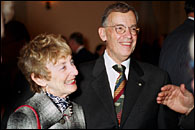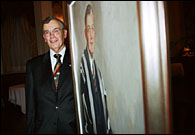Principal's curtain call
When Principal Bernard Shapiro arrived on the job eight-and-a-half years ago, he said, "I found an institution with a very long history and a very high level of achievement both in its teaching and research programs. And somewhat," he paused, "disheartened."
Funding was low, staff members were stretched, students were faced with cold shoulders and red tape. McGill's role in Quebec was tenuous. There were a lot of challenges facing this Montreal native and McGill grad in his new position.
 Phyllis and Bernard Shapiro
Phyllis and Bernard ShapiroPHOTOS: Claudio Calligaris |
|
His term runs out at the end of December. The Reporter caught up with the busy principal for his thoughts on the job.
To lead a huge decentralized institution, Shapiro said, "you can't get anywhere by issuing marching orders. You have to do it much more indirectly, much more convincingly. In the end it's whether you have an interesting story that other people can believe in and attach themselves to."
McGill Chancellor Richard Pound, who took office the same day Shapiro did, said, "I think he's done an exemplary job under increasingly trying circumstances. When you're principal of the leading university in the province, and possibly the country, faced with insane funding concepts, it's a challenge to keep bricks and mortar together and make certain the university remains a place of ideas."
"He works like a fiend," Pound added.
Shapiro measured how effective he was by the number of advances at the university. "You've got to allow the profile, the programs, the research to shift over time in response to the changing structure of knowledge and the changing world around us." Without new people or new buildings, McGill would go into intellectual rigor mortis.
The university needed "to know that this is a place that is striding into the future, not just slouching into the future."
The future is popping up all over campus. Shapiro is pleased the law library, student services building, Genome building and the Macdonald campus EcoResidence are complete; the Trottier building is well underway, so are plans for the music building and money's been raised for a new home for life sciences. But it's not enough, he said, lamenting the deferred maintenance problem. "One wouldn't win the Nobel Prize for this."
Shapiro is glad to have seen "not only the renewal of the staff, but the stunning success of the staff in competing for funds under the new federal research programs." The need for space and support staff resulting from this success is a "happy kind of problem to deal with."
There hasn't been only success for Shapiro. In the early '90s "McGill was famous for what I would call, uh," he paused, "awkward bureaucracy." The "culture of the counter, where the student met the university, was not as welcoming as it should be." Although Shapiro sees improvement, thanks to those who worked hard on client relations, he said, "I'm not comfortable that we really have got the student in our focus, with the kind of importance and consideration that they deserve."
Shapiro took student concerns seriously, as well as those of non-academic staff (including his own staff, being quick to resolve problems and promote harmony). Although demanding to work with, he was fair.
Kate Williams, director of the University Relations Office, worked closely with Shapiro in media and public situations. "On a personal level he is extremely warm with a good sense of humour, but somewhat austere in groups. Journalists love him because he's very direct, very blunt. Sometimes too blunt! I had to mend fences on occasion."
 Bernard Sharpiro and his official McGill portrait by Toronto artist Furmanczyk
Bernard Sharpiro and his official McGill portrait by Toronto artist Furmanczyk |
|
Shapiro is not one to mollify with sweet words. Williams remembered student groups protesting over his salary when he first arrived. He told them "they were getting a bargain even if his salary were twice what it was." Not one to back down, Shapiro wasn't apologetic. If a mistake ever was made, Williams added, "He didn't dwell on it, he just moved on."
Claire Boudreau, now administrative assistant to the vice-principal (administration and finance), was with the principal for four years, his office shadow after the first year, attending meetings, liaising with vice-principals, keeping track of the day-to-day workings and becoming attuned to his moods. "Some days he wouldn't get home until 11:30 at night and the next morning he'd be in at 6:15," Boudreau said.
"When I'd come in at 7:30 in the morning and the opera was blaring, I always knew what mood he was in. If I didn't hear his fingers tapping, I knew 'oh oh.'" Boudreau said. If the music was "light and airy" he was doing fine, if it was "hard and heavy, I thought 'oh boy, he's working on a problem or something's up.'
"We had a really good working chemistry. The first year I was petrified -- what am I doing? I'd ask. But once I let my guard down, it was wonderful. There wasn't a day we wouldn't laugh," she said. "The opportunity brought a lot to me as a person. I got to see a side of him most didn't.
"I knighted him Sir Bernard on his birthday. Mrs. Shapiro wanted to be called a lady, so we couldn't call her that without making Bernard a lord! Sir Bernard and Lady P will stick in my mind forever."
Dean of Arts Carman Miller thought the closing tribute to Shapiro in Senate December 4 was one of the finest moments he'd witnessed in that assembly.
Senator Sam Noumoff publicly thanked the principal and secretary general Victoria Lees (who is also parting) and announced the establishment by Senate of a $500 annual award in Shapiro's name to the best student in music theory, and presented him with a conductor's baton. "I should have had this nine years ago," the pleased principal quipped. He added that he'd been warned of the rigours of controlling Senate before he got to McGill, but found he relished the experience. Miller said, "Shapiro handled Senate beautifully and with respect, because he was at home in the university."
So how has McGill affected him? Shapiro said, "It's made me feel younger. I think there's something about the constant interaction between yourself and so many other people -- young, middle aged, old -- that's incredibly energizing! You get to meet all these fascinating people, each of whom has a fascinating story to tell. You get energized by it, because it's so interesting.
"One of my greatest strengths I think, though I hadn't thought about it before I came to McGill, was I'm able to sustain my fascination with people. No matter how weird."
Shapiro said he's avoided becoming cynical yet retained his skepticism, always questioning his actions. He's gained much from, and heeds often, the people who let him know what's on their mind.
"There are so many different points of view at the university, each of which has something interesting to be said for it. There're not many people walking around with crazy ideas, just different ideas. And it's made me much more conscious of the added value those ideas might have in terms of my own strategy for the future of the university."
Retirement doesn't mean he's going to be sipping tea by a beach. His wife, education professor Phyllis Shapiro (who is his match in stamina), said "The telephone has not stopped ringing with people inviting him to do 1,001 things!" From being part of the Société du Havre de Montréal (which will oversee Montreal's harbourfront development), to being named Chair of the Board of Governors of the Royal Military College, to preparing for a course he's teaching on educational policy next fall at McGill, Shapiro's going to be keeping busy.
Following his penchant for music, he's chairing the Montreal Symphony Orchestra's committee for the next musical director. (How's the search for Maestro Dutoit's successor? "It's going well, but we're not there yet," he said with a smile.)
Art of the ear is not the only one of Shapiro's passions. He's taking undergraduate art history courses now with an eye to a master's degree in the future. After a lifetime of wandering around museums, he wants to pursue the kind of knowledge that would enable him to enjoy the visual experience really well.
In March he'll head to New York's Metropolitan Opera House to hear Berlioz's Les Troyens, a present from his cabinet. "I've now got the CD and I'm going to listen to it over and over again for the next three or four months, so when I get there I'll actually know something and be able to really enjoy the opera."
Shapiro's love of opera stems from his parents' housekeeper who loved listening to opera, and his mother, who listened to Saturday afternoon broadcasts from the Met. A trip to see Verdi's Aida with some family friends, at the old Her Majesty's Theatre on Guy St. near Ste. Catherine's, thrilled the young Shapiro. "I just knew that this was going to be for me! I never analyzed it more carefully. I think it just brought together many different forms of stimulation. There was the sound, the sight, and there was the action. However unbelievable it all was on some literal level, it was all very believable on an emotional level. I've been with it ever since."
He also looks forward to spending more time with family. (Phyllis Shapiro said, "Our children and grandchildren say they lent us to McGill for nine years, and now they want to reclaim us.")
"I'm just relaxing!" Shapiro said. "I've been telling my wife I don't know what it's going to feel like, after all these years having these jobs with relatively complex responsibilities to find myself without one. Why should I guess? There's no reason to hurry. I won't have the job after this month and I'll see how I feel and then I'll behave accordingly."

